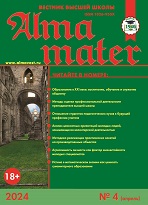https://doi.org/10.20339/AM.05-17.083
Н.В. Гуськова,
канд. ист. наук, доц. кафедры английского языка
для экономических и математических дисциплин
НИУ Высшая школа экономики
e-mail: hse_guskova@mail.ru
Исследованы новые модели лингвообразовательных технологий в обучении иностранному языку. За время своего существования система классного образования приняла массовый характер и имеет свои социальные и экономические основы, точно также как и политические и культурные проблемы по унификации всего ее пространства. С развитием науки и технологий изменилось содержание академических дисциплин, увеличился их содержательный аспект. В организационном плане тоже наметились проблемы. Возможно, система обучения иностранным языкам в этом отношении — одна из самых прогрессивных, актуальный план содержания обучения каковой позволяет варьировать методы и формы обучения. В рамках данной статьи автором оценивается основной подход к преподаванию иностранных языков в историческом развитии для того, чтобы установить его современный этап развития.
Ключевые слова: система образования, занятия, ученики, обучение.
Литература
- Bashmakova, I. On the formation of professional communication skills in a foreign language at students of n0ot language universitys. Bulletin of Moscow State Linguistic University. 2003, vol. 477, pp. 24–29.
- Bekarevich, T.I. Concept of Approach in theoretical studies on methods of teaching foreign languages in university. In: Theory and practice of education in the modern world. Saint Petersburg, 2012.
- Galskova, N.D., Gez, N.I. The theory of learning foreign languages. Didactics and methodology. Moscow, 2006.
- Gusevskaya, N.Y. Evolution of foreign language teaching methods. Scientific notes of the Trans-Baikal State University. Series of professional education, learning theory and methodic. 2013, no. 6 (53), pp. 167–171.
- Igna, O. Training of future foreign language teachers manage learning activities in the classroom. Scientific-pedagogical review (Pedagogical Review). 2013, no. 2, pp. 36–44.
- Kashin, E.G. Tradition and innovation in methods of teaching foreign language. Samara, 2006.
- Polat, E.S., Buharkina, M.Yu, Moses, M. Theory and practice of distance education. Moscow, 2014.
- Starodubtseva, O.G. Types of exercises for the formation of lexical skills spoken language in not language university. Scientific-pedagogical review (Pedagogical Review). 2013, no. 2 (2), pp. 45–48.
- URL: http://www.ffl.msu.ru/research/publications/ter-minasova-lang-and-icc/te...
- URL: www.minuspk.ru/resource/resource1254142612.doc
- Al-Thakeb, F. The Arab Family and Modernity: Evidence from Kuwait. Current Anthropology. 1985, no. 26 (5), pp. 575–580.
- Berwick, R., Ross, S. Motivation after Matriculation: Are Japanese Learners of English still Alive after Exam Hell? JALT Journal. 1989, no. 11 (2), pp. 193–210.
- Biao, Z. Lines and Circles, West and East. English Today. 2001, no. 67, pp. 3–8.
- Block, D. (2007). Second Language Identities. London: Continuum.
- Denzin, N.K., Lincoln, Y.S. (2005). Handbook of Qualitative Research. Thousand Oaks, CA: Sage Publications.
- Gruber, S., Boreen, J. Teaching Critical Thinking: Using Experience to Promote Learning in Middle School & College Students. In: Teachers and Teaching: Theory & Practice. 2003. 9(1), 5–19.
- Guba, E.G., Lincoln, Y.S. Paradigmatic Controversies, Contradictions, and Emerging confluences. In: Handbook of Qualitative Research. 2005, Thousand Oaks, CA: Sage Publications, pp. 191–215.
- Guest, M. A Critical checkbook for Culture Teaching and Learning. ELT Journal. 2002, no. 56(2), pp. 154–161.
- Holliday, A. (2005). The Struggle to Teach English as an International Language. Oxford: Oxford University Press.
- Holliday, A. (2011). Intercultural Communication and Ideology. London: Sage Publications, Ltd.
- Kamal, A. (2012). Perceptions of Globalization among English Language Students at Kuwait University: Voices of Ownership. Unpublished thesis, Canterbury Christ Church University.
- Kumaravadivelu, B. (2003). Beyond Methods: Macrostrategies for Language Teaching. Yale: Yale University Press.
- Kumaravadivelu, B. (2008). Cultural Globalization and Language Education. Yale: Yale University Press.
- Kvale, S., Brinkmann, S. (2009). Inter Views: Learning the Craft of Qualitative Research Interviewing. Los Angeles: Sage Publications.
- Martin, A. An Experience of Teaching in the United Arab Emirates. English Today. 2003, no. 74 (19/ 2), pp. 49–54.
- Matsumoto, K. English Instruction Problems in Japanese Schools and Higher Education. Journal of Asian Pacific Communication. 1994, no. 5 (4), pp. 209–214.
- Menard-Warwick, J. The Cultural and Intercultural Identities of Transnational English Teachers: Two Case Studies from the Americas. TESOL Quarterly. 2008, no. 42 (4), pp. 617–640.
- Montgomery, C. (2010). Understanding the International Student Experience. London: Palgrave Macmillan.
- URL: http://www.northumbria.ac.uk/static/5007/cetlpdf/OP4.pdf
- Scheurich, J.J. (1997). Research Method in the Postmodern. London: Routledge Falmer.
- Seaton E. Common Knowledge: Reflections on Narratives in Community. Qualitative Research. 2008, no 8 (3), pp. 293–305.
- URL: http://www.ncte.org/cee/2007 summit/globalization
- Zhu H. Globalization and New ELT Challenges in China. English Today. 2003, no. 76, pp. 36–41.
- Zoller, U., Ben-Chaim, D., Ron, S.T., Pentimalli, R., Scolastica, S.A., Chiara, M.S., Borsese, A. The Disposition Towards Critical Thinking of High School and University Science Students: An Interintra Israeli-Italian Study. International Journal of Science Education. 2010, no. 22 (6), pp. 571–582.











.png)






